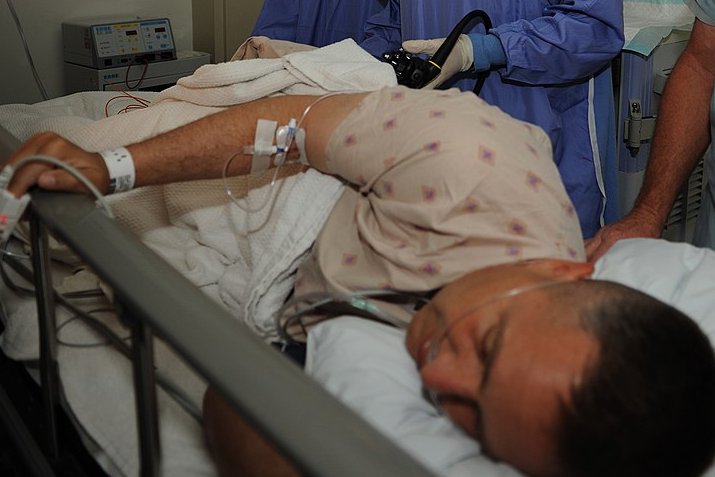An analysis suggests that performing colonoscopies before age 50 -- as currently recommended -- could catch cancer cases earlier, when they are easier to treat. Photo by Mass Communication Specialist 2nd Class Chad A. Bascom/U.S. Navy
Jan. 31 (UPI) -- When it comes to a colonoscopy, sooner may be better than later -- at least based on findings published Friday in JAMA Network Open.
The analysis of colon and rectal cancer rates among adults in the United States found there is a 46 percent increase in new diagnoses from ages 49 to 50, an indication that latent cases are perhaps going undiagnosed until routine screenings.
The researchers also report that nearly 93 percent of cases discovered at age 50 were invasive, meaning most would require more aggressive treatment -- perhaps surgery, chemotherapy or radiation, Dr. Jordan J. Karlitz, study co-author, gastroenterologist in the Southeast Louisiana Veterans Health Care System and director of the GI Hereditary Cancer and Genetics Program at Tulane University School of Medicine, told UPI.
"Given that cancers may take several years to grow, these lesions were likely present and developing for several years prior while patients were in their forties, but ultimately detected with screening initiation at age 50," Karlitz said.
Colon and rectal cancers are the second leading source of cancer deaths in the United States. As rates for younger adults continue to rise, some experts have argued that routine screening -- in the form of a colonoscopy -- should be started earlier.
In 2018, the American Cancer Society modified their recommendations to call for routine screening to start at 45 years of age. However, the U.S. Preventive Services Task Force, which sets federal standards, currently recommends screening begin at 50 because rates for colon and rectal cancers among adults between age 45 and 49 remain relatively low.
For the analysis, Karlitz and his colleagues reviewed colorectal cancer rates in one-year increments in adults between 30 and 60 years of age from 2000 to 2015. They operated under the assumption that if there were many undetected, asymptomatic cases of the disease there would be a marked increase in cases in people between age 49 and 50 -- when screenings begin.
The assessment revealed there is a significant increase in diagnoses from 34.9 diagnoses per 100,000 49-year-olds to 51 cases per 100,000 50-year-olds. These increases were seen in both men, at nearly 53 percent, and women, just over 39 percent, as well as white adults, at 46 percent, and black adults, at 46 percent.
"Given debate and differing guidelines over when average-risk colorectal cancer screening should begin, we felt that performing a detailed incidence rate analysis in one year age increments would be revealing," Karlitz noted. "These findings support a significant undetected preclinical colorectal cancer burden in those under age 50, which is not reflected in observed incidence rates. Hence, relying on observed incidence rates of those 45 to 49 years of age alone to assess potential impacts of earlier screening may underestimate cancer prevention benefits."















